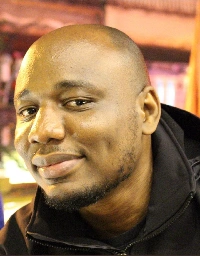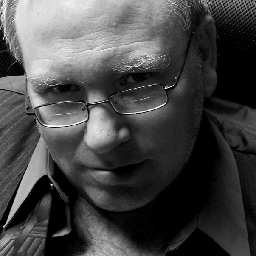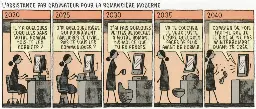WOLE TALABI is an engineer, writer, and editor from Nigeria. He is the author of the nebula and BSFA award nominated novel SHIGIDI AN...

Short interview: Wole Talabi
> WOLE TALABI is an engineer, writer, and editor from Nigeria. He is the author of the nebula and BSFA award nominated novel SHIGIDI AND THE BRASS HEAD OF OBALUFON (DAW books/Gollancz) one of the Washington Posts Top 10 Science fiction and fantasy books of 2023. His short fiction has appeared in places like Asimov’s Science Fiction, Lightspeed Magazine, Africa Risen and is collected in the books CONVERGENCE PROBLEMS (DAW books, 2024) and INCOMPLETE SOLUTIONS (Luna Press, 2019). He has been a finalist for the Hugo, Nebula, BSFA and Locus awards, as well as the Caine Prize for African Writing. He has won the Nommo award for African speculative fiction and the Sidewise award for Alternate History. He has edited five anthologies including the acclaimed AFRICANFUTURISM: AN ANTHOLOGY (Brittlepaper, 2020) and MOTHERSOUND: THE SAUÚTIVERSE ANTHOLOGY (Android Press, 2023). He likes scuba diving, elegant equations, and oddly shaped things. He currently lives and works in Australia. Find him at wtalabi.wordpress.com and at @wtalabi on Twitter, Instagram, Bluesky and Tiktok.
1) According to you and apart from the number of words, what is the main difference between a short story and a novel?
I think a short story is primarily asking one question or exploring one idea or illustrating one theme and as such it has just enough of what it needs (character, plot, etc.) to execute that effectively. A novel may have multiple ideas or questions or concepts, or even if it has on one main one, it will typically have others that it touches on, in service of that larger, main idea of theme and it carries as much as it needs to explore them fully.
2) What's your favorite short story?
The impossible question. There are far too many to list. So instead I'll just mention three stories I love. The ones that come to mind first right now. Those would be Exhalation by Ted Chiang, Spider The Artist by Nnedi Okorafor, and A Walk In The Sun by Geoffrey Landis.
3) What's your favorite short story written by you?
The second impossible question. This is like asking a parent to choose a favorite child. So instead I'll change the question to one that's different but has the same spirit. Which 3 of my short stories do I feel illustrate my writing the most? I'd say:
4) How does your African heritage influence your science fiction writing?
Well I grew up in Nigeria which is a fascinating place. The blend of languages, cultures, philosophies, religions, beliefs, economics and so much more all existing side by side is dizzying. And the modern country, especially in large urban centres like Lagos, full of young, eager people, tends to have a chaotic energy that’s hard to describe, something I try to capture in most of my fiction. I am also more specifically ethnically Yoruba and Yoruba culture has an intricate traditional belief system that includes a rich pantheon, complex philosophies and technologies, intricate rituals and so much more. While I grew up urban and Christian, I have always found Yoruba traditional belief and history fascinating and complex, and I try to incorporate as much of it as I can in my work right beside any scientific and technological development, I envision using my engineering interests. Sometimes I build my imagined future technology on a scaffold of Yoruba spiritual beliefs. This is because as much as I consider myself a "logical and scientific minded" person, I grew up in Nigeria where often the physical and spiritual are presented side by side seamlessly with no separation. In addition, I also acknowledge the vastness of what is not yet known in the universe and all the different ways in which people have filled those gaps. It is in the spaces between our knowledge or in the ambiguity of our perceptions that I try to fit the spiritual elements of my stories. Humans have had magical and spiritual beliefs since we formed societies and I believe we will continue to do so, therefore the blending of both seems natural to me, even when speculating about the future. So readers shouldn't be surprised to find some almost mystic-leaning elements in my science fiction, even in my so called "hard-SF" stories.
5) What themes or issues specific to Africa do you explore in your science fiction?
I'm particularly interested in application of the often ignored traditional African philosophies and sociocultural practices as frameworks for thinking about the future of humanity.
6) What are you currently working on?
l have two short stories coming later this year. One called “Encore” - a sequel to the first story in my collection CONVERGENCE PROBLEMS. Its about an AI-artist set 3 million years in the future and is one of my favorite stories I have ever written. It will appear in Deep Dream: Science Fiction Exploring the Future of Art, edited by Indrapramit Das, from MIT Press in October 2024.
Also in October, I have a horror-fantasy story coming from Subterranean Press called “Unquiet On The Eastern Front” which takes place across Africa during World War II as a British soldier comes face to face with the horrors of colonization, war, his own family legacy, and a stalking, terrifying creature. It will be available to read for free.
I'm also working on my second novel – a science fiction novel which is simultaneously a near-future thriller and a meditation on the nature of memory, legacy, and connectedness featuring assassins, aliens, AI, ancestral memory, and a lot more. No publicly available title yet, but I’m excited to finish this story I’ve been mulling over for years.
#talabi #shortinterviews
----
Grab a copy of Wole Talabi's latest short fiction collection.
Do you have the name in mind, by chance. Re: political message: I publish all kind of writers, from the left to the right, so it doesn't matter
Any polish story rec appreciated. NB: as I've said, I'm done with Western stories (I've been at it since 2019). I'm open to suggestions of stories from all of the Eastern (and African, if there exists some scenes there) zone.
As you may have read earlier, I've taken a break. Today, I'm ready to relaunch SFSS in a new direction. I don't feel like publishing West...

As you may have read earlier, I've taken a break. Today, I'm ready to relaunch SFSS in a new direction. I don't feel like publishing Western stories anymore, so I'm looking elsewhere.
I started with Vietnam, a country I'm particularly fond of (I spent the best year of my life there), but the SF scene there is almost non-existent and the few stories I've read aren't very good.
With the help of a Polish friend, the next few weeks will be devoted to finding good untranslated Polish stories.
Finally, if you yourself are fluent in an Eastern language and would like to collaborate with me, please don't hesitate to contact me: [email protected]
NB: any other suggestions/comments are welcome.
Should have read the rules before, ok.
Im sharing an article talking about my book
Newsblur is open-source and has a great interface.
Here is my recent Misha Burnett's interview.
O2 Day (2023) – Misha Burnett
Misha Burnett has little formal education, but has been writing poetry and fiction for around forty years. During this time he has...

Enjoy!
I was a bit disappointed by Saga, OP. Much preferred Y the Last Man!
C'est pas tombé dans l'oreille d'un sourd.
c’est cher, c’est technique, faut internet et faire des maj
Autant de problèmes mais je vais quand même regarder de ce côté.
Empreinte écologique : atroce
Ca ce n'est pas un problème, j'ai le sens des priorités.
Peut-etre ya des modèles pour senior ou plus simple qui font juste clignotant ?
Je vais regarder.
le tel Doro est très bien.
Il ne sonne pas assez fort (83dB)
Pourquoi pas une tablette ? c’est un énorme smartphone. :)
C'est une idée si je trouve un launcher type 3310 !
En tout cas, faut tester
Oui voilà !
Oui, elle est en EHPAD, pas droit aux fixes.
Elle est en EHPAD, j'aurais dû le préciser dans l'OP.
Problème : elle est incapable de se servir d'un smartphone. Et même avec un dumbphone, le tel est souvent à plat, elle oublie de le brancher. Du coup l'ampoule ça serait top, mais à quoi la relier de durable à un bouton ? Je n'y connais rien en domotique...
Merci je vais en causer itou avec la famille.
Merci, on va discuter en famille de l'option aide auditive.
Les modeles tournent autour de 80dB. Ce n'est pas suffisant...
Ok merci !
Pas assez bruyants.
This link works: https://rss.app/feeds/Ig8HbCNvvJ1tcjVG.xml
Doesn't work...
It freaking doesn't work
I've tried as many tools as I can, but I can't seem to create an RSS feed for this site. Any help appreciated.
A hub of Jewish life, Tablet features news, essays, podcasts, and opinion, covering arts, pop culture, technology, holidays, sports, and more.

Misha Burnett has little formal education, but has been writing poetry and fiction for around forty years. During this time he has su...

> Misha Burnett has little formal education, but has been writing poetry and fiction for around forty years. During this time he has supported himself and his family with a variety of jobs, including locksmith, cab driver, and building maintenance. His first four novels, Catskinner's Book, Cannibal Hearts, The Worms Of Heaven, and Gingerbread Wolves comprise a series, collectively known as The Book Of Lost Doors. More information about upcoming projects can be found at https://mishaburnett.wordpress.com/
1) According to you and apart from the number of words, what is the main difference between a short story and a novel?
I think that word count divisions are arbitrary, largely determined by the economics of printing. Ideally, a story should be as long as it takes to tell it, whether that's 5,000 words or 500,000. In practical terms, there are pressures on authors to write stories of a certain word count. There are a lot of novels that would have been good short stories but have been bulked out by tens of thousands of words of padding. My own sweet spot tends to be between 10,000 and 20,000 words, which many folks consider to be too long for a short story, but is far too short for a novel.
2) What's your favorite short story?
That's a tough one. Probably Bradbury. At this exact moment I would probably say, “There Will Come Soft Rains”. Ask me again tomorrow and it might be “The Veldt” or “Usher II”.
3) What's your favorite short story written by you?
Another tough question. I think I'll go with “She That Was So Proud And Wild” from my collection Dark Fantasies. I wanted to sketch out a world similar to ours, but containing fantastic elements, and in this world I set a thorny ethical problem, and I tried to do both of those things without a mass of exposition or preaching. I think I managed it. But, like the question above, if you ask me tomorrow I'll probably say something different.
4) The descriptions of your characters and their mentality are striking. Sometimes we recognize ourselves in a particular reaction (not necessarily a glorious one). Where do you get this ability to describe reality?
I paint what I see. I think it's important for a writer of fiction to be able to extrapolate from life experience. You can't know what it feels like to be attacked by a dragon, but you probably do know what it feels like to be an automobile accident, so use that. The caveat is that you have to be honest—there is always a temptation to describe what you think you should have been feeling, or to make it more like a movie. Introspection is vital for a fiction writer.
5) Modern SF is often characterized by a bleak view of human nature. In your work, the theme of redemption is prevalent and a certain optimism reigns. Can you tell us more about this?
Fiction is a vicarious activity. As readers, we experience things that didn't really happen, and do things that we didn't actually do. I read for pleasure, which means that I want to finish a book thinking, “If those things had happened to me and I reacted in the way that those characters reacted, I would feel good about myself.” So that's what I want to supply to my readers.
In addition, I think it's more realistic. Most people are decent, most of the time. At least in my experience, and I have met a lot of people in my life.
6) Your stories are real page-turners. Could you describe your writing process?
Primitive. I start at the beginning, go on to the end, then stop. I don't do drafts, I don't do outlines, I seldom rewrite anything. With very few exceptions, what you see on the page is exactly what I typed the first time. Lots of authors tell me that no one can write this way, that nothing that hasn't been rewritten a dozen times will ever sell, but I do okay with my method.
Grab a copy of Misha Burnett's Endless Summer: Twelve Strange Tales of Mankind's Future
